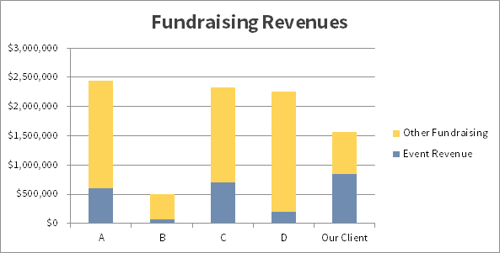How Conducting A Benchmarking Study Can Transform Your Fundraising

A lot of organizations make some pretty big assumptions about their development programs. These assumptions might sound like: “We need to increase our corporate gifts,” or “Planned giving just doesn’t work for us.”
Nonprofits frequently look at their own previous fundraising results to plan and strategize. But the truth is, it can be a challenge to see what’s working, or what you’re not doing so well, until you have an understanding of how you stack up against your peers.
When comparing yourself to others, don’t fall into the trap of relying on anecdotes. A board member might say, “That other animal shelter has really successful events! Why aren’t we doing that?” But an anecdote is not data, and it doesn’t paint a full picture of the success of an organization’s fundraising program.
Benchmarking collects anecdotes and raw numbers to find trends and common themes. Large benchmarking studies, like those done by CASE, are a great resource. Many institutions still find, however, that they don’t quite fit the defined organizational categories or that they want more details than large studies are able to provide.
Getting context and specificity is one of the greatest benefits of conducting your own small-scale study. By comparing yourself to 4-10 other institutions, you may find some surprising truths that shatter your previous assumptions.

We’re all tempted to stick to what we know. Frequently, I see organizations excelling in one area of fundraising while neglecting the importance of others.
If you’re guilty of this, a benchmarking study will show you. One of my clients learned that they were surpassing their peers in events fundraising, but that their peers largely raised more money. We were able to see that our client was very behind in their membership numbers. No one had even realized membership was an issue!
Your organization also might be able to learn something from the experience of your peers. I was working with an organization that supported artists, and they hoped to increase donations from art collectors. When we discovered that none of their peers had success with that strategy, we quickly learned that we needed to abandon that idea and focus our efforts on different tactics.
A benchmarking study can help you know when to change course and invest in your fundraising program much more strategically. It takes a week or two for one person to do a simple study, but the invaluable information you find can truly transform your program.


Comments
Questions or comments? Join the conversation!